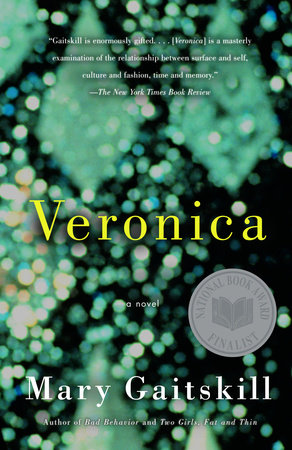Reading Group Center
- Home •
- Books by Category •
- Imprints •
- News •
- Videos •
- Media Center •
- Reading Group Center
Veronica
By Mary Gaitskill
National Book Critics Circle Award Finalist
A New York Times Book Review Best Book of the Year
“Gaitskill is enormously gifted. . . . Throughout the book are passages of plainly spectacular beauty. . . . [Veronica] constitutes some of the most incisive fiction writing around.” —The New York Times Book Review
The introduction, discussion questions, suggestions for further reading, and author biography that follow are designed to enhance your group’s discussion of Mary Gaitskill’s Veronica, which The New York Times Book Review hailed as “a masterly examination of the relationship between surface and self, culture and fashion, time and memory.”
1. What is the significance of the story Alison’s mother told her about the wicked little girl when she was a child? In what ways does it function as a kind of parable, or prediction, of Alison’s life?
2. Alison’s narrative shifts between past and present, or rather between several layers of the past and the present. What effects does Mary Gaitskill create through this method of narration? In what ways does it mirror the way the mind and memory actually work?
3. What kind of relationship does Alison have with her parents and with her sisters? How do they view her modeling career?
4. Gaitskill often personifies music in Veronica: “music, lightly skipping in the main rooms, here bumbled from wall to wall like a ghost groaning in purgatory” [p. 133]; “Music fell out of windows, splattered on the ground, got up, and walked away” [p. 141]. Why does Gaitskill emphasize music throughout the novel? Why is music so important to Alison?
5. Alison dreams of being a poet. In what ways is her narrative—in terms of its language and emotional intensity—suffused with poetry?
6. Veronica tells Alison: “prettiness is always about pleasing people. When you stop being pretty, you don’t have to do that anymore. I don’t have to do that anymore. It’s my show now” [p. 44]. How does Alison’s beauty enslave her? In what ways is Veronica more free because she lacks such beauty?
7. How does Alison’s experience as a model affect her—morally, emotionally, financially?
8. What does Alison mean when she says that she became a demon and “was saved by another demon, who looked on me with pity and so became human again. And because I pitied her in return, I was allowed to become human, too” [p. 256]? Why would such a mutual pity enable Alison and Veronica to regain their humanity? What is the source of this pity?
9. What does the novel suggest about the harsher reality beneath the surface glamour of the fashion industry? How do people treat each other in this world?
10. How does Alison fall from modeling in Paris to cleaning the photographer’s office in San Rafael? Is one job more demeaning than the other?
11. Why is Veronica so important to Alison? How and why does Alison’s relationship to Veronica change over the course of the novel?
12. What does the novel reveal about the early days of AIDS? How do people react to Veronica when they learn she has AIDS?
13. Veronica is an exceptionally painful novel, filled with sickness, cruelty, suffering, and death, and yet it ends with Alison saying, “I will call my father and tell him I finally heard him. I will be full of gratitude and joy” [p. 257]. What has she finally heard? What is she grateful for? Why does she anticipate such joy?


